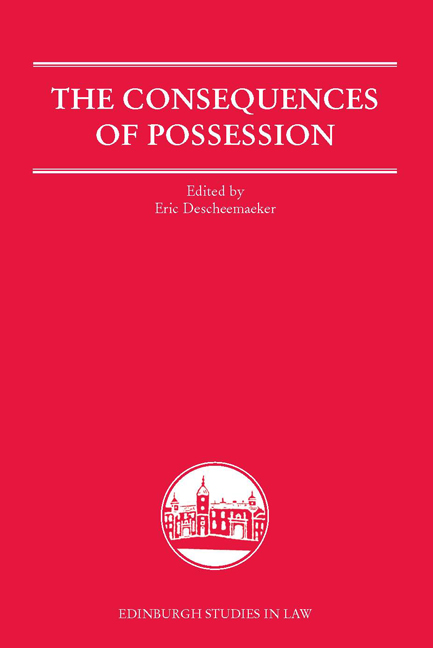Book contents
- Frontmatter
- Contents
- Foreword
- List of Contributors
- Table of Cases
- Table of Statutory Materials
- 1 The Consequences of Possession
- 2 Why Protect Possession?
- 3 Is Possession Factual or Legal?
- 4 Possession as a Source of Property at Common Law
- 5 The Evolution of Possessory Actions in France and Italy
- 6 The Protection of Possession in Scots Law
- 7 Possessio civilissima in Spanish and German Law: Protecting Possession between Fact and Fiction
- 8 Possession of Incorporeals
- 9 The Protection of Quasi-Possession in South African Law
- Index
6 - The Protection of Possession in Scots Law
Published online by Cambridge University Press: 07 December 2017
- Frontmatter
- Contents
- Foreword
- List of Contributors
- Table of Cases
- Table of Statutory Materials
- 1 The Consequences of Possession
- 2 Why Protect Possession?
- 3 Is Possession Factual or Legal?
- 4 Possession as a Source of Property at Common Law
- 5 The Evolution of Possessory Actions in France and Italy
- 6 The Protection of Possession in Scots Law
- 7 Possessio civilissima in Spanish and German Law: Protecting Possession between Fact and Fiction
- 8 Possession of Incorporeals
- 9 The Protection of Quasi-Possession in South African Law
- Index
Summary
POSSESSION IN SCOTS LAW
This paper is concerned with how possession is protected in Scots law. Most of the paper is concerned with one possessory remedy in particular, the so-called possessory judgment. To see how this fits into the law of possession more generally, we shall begin with an overview of the Scots law of possession.
Unlike the majority of civilian systems of property law, Scots law is not codified. Except where the law is governed by statute (and the law of possession is largely free from this), we look to the institutional writers of Scots law, especially Stair, and to the decisions of the courts.
When we look at the Scots law of possession, we find marked similarities to the Roman law. For example, we see in Roman law a distinction drawn between possession and ownership, Ulpian saying that the two have “nothing in common”, with the result that possessory questions are not determined by asking who has the right to possess. Possession gives no right to possess beyond a right not to have that possession disturbed without consent or legal process. Certainly, it gives no rights against third-party acquirers: the main possessory interdicts, utrubi for moveables and uti possidetis and unde vi for land, are not worded to give any right against third parties. Furthermore, Ulpian makes it clear that, if I acquire possession from one who got it forcibly, my possession is not thereby tainted.
We find the same approach in Scots law. Possession is “a distinct lesser right than property”, giving “the right to continue it against all illegal contrary acts”. In Scots law, possession is protected by the remedy of spuilzie, more commonly known as ejection when it relates to land. This gives the right, on being dispossessed without consent or order of the court, to be restored to possession pending consideration of the question of right: spoliatus ante omnia est restituendus. However, possession gives no right to possess beyond this, and the remedy is not available against third parties.
- Type
- Chapter
- Information
- The Consequences of Possession , pp. 111 - 140Publisher: Edinburgh University PressPrint publication year: 2014



